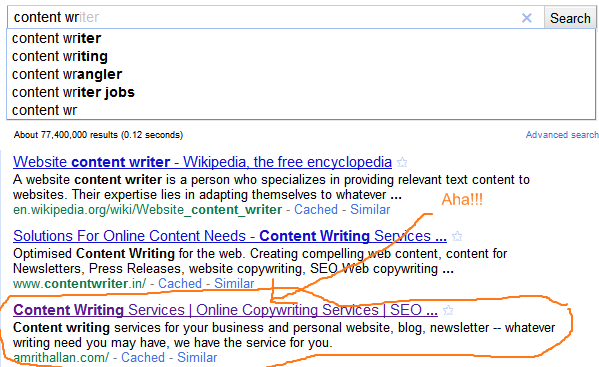 Contrary to popular beliefs – mostly propagated by snakeoil SEO Experts – SEO content for your website is not a different entity. It is not something that you write or publish specifically to improve your search engine rankings.
Contrary to popular beliefs – mostly propagated by snakeoil SEO Experts – SEO content for your website is not a different entity. It is not something that you write or publish specifically to improve your search engine rankings.
In fact, if you are publishing content just to improve your SEO without paying scant regard to how your content converts (how it helps you grow your business), you are just like that proverbial dog chasing its proverbial tail. You go round and round, but nothing much happens, and then you wonder, why nothing much happens?
But it doesn’t mean there is no such thing as SEO content. If you want to improve your search engine rankings then you have to pay attention to creating and publishing search engine friendly content that is ranked well by major search engines like Google and Bing. You need to know how to write SEO content for your website and for your blog.
Although just good content doesn’t guarantee better SEO, it is the first step, and first step is always very crucial. After all, if you don’t have content, what’s the search engines going to rank? In order to enjoy good search engine rankings, aside from knowing how to write SEO content for your website, you also need to
- Publish content regularly over a long period of time
- Become an authority in your field so that lots of people link to your content
- Get your content shared on social media and social networking websites like Facebook, Twitter, LinkedIn, Google+ and the others
In order for your website to enjoy good search engine rankings, all these activities should go on as a collective effort.
But the focus of this blog post is to know how to write SEO content for your website.
The highlights of these 10 points are:
- Define the objective of the webpage
- Narrow the topic as much as possible
- Try to pack as much information as possible
- Thoroughly research your keywords
- Optimize for longer phrases
- Use headings and sub- headings to organize text
- Link to pre-existing pages
- Provide answers to questions
- Pay close attention to accessibility
- Make your webpages as fast-loading as possible
These individual points are explained in detail below…
1. Define the objective of the web page
This is very important. Why are you creating the webpage that you are creating, or the blog post that you are creating? What is the most important message that you want to convey? What sort of information do you want to give to your prospective customers and clients? The webpage should have an aim. It should provide some sort of value to people to find the link on search engines.
When people are trying to write lots of SEO content for their website, this is the aspect that they often overlook. They simply go on publishing lots of webpages hoping that it would improve their search engine rankings. This can have an adverse effect. If you don’t have an objective, how do you think search engines can know what exactly you are trying to do? They need to know it clearly in order to be able to highlight your link in front of the users. If you aimlessly publish content, your SEO credentials will be diluted and your subject-related authority will be undermined.
2. Narrow the topic as much as possible
The narrower the topic, the better will be its SEO prospects. For example, what does this blog post do? It tells you how to write SEO content for your website. It briefly explains that SEO content isn’t the only thing that can give you better search engine rankings, but the topic or the title of the blog post clearly defines what I intend to do. This way, if the search engines decide to rank this blog post, their algorithms will know exactly for what they should rank it: people who want to learn how to write SEO content for their websites.
3. Try to pack as much information as possible
Longer webpages and blog posts are preferred over shorter webpages and blog posts by the search engines these days. This is because writing longer webpages requires effort. Spammers don’t want to spend much effort when creating pages. There was a time when they would simply copy/paste a few paragraphs and that would improve their search engine rankings. Not now. The webpages and blog posts should be well-researched, giving lots of information to the readers. In fact, it’s better if your webpages and blog posts are multi-paged. This way you may be forced to publish fewer webpages and blog posts, but their impact would be much better than smaller webpages and blog posts.
4. Thoroughly research your keywords
Although many discount this, keywords are still important. Most of the search engines these days can rank your webpages and blog posts according to your central message, but irrespective of what language you use, you still need to take care of your keywords.
Keywords are the words that carry the true meaning of your message. They are the words people will be using to look for the content you want them to find. For example, there is a great chance you are reading this blog post after searching for how to write SEO content for websites.
Whether you want to use jargon or not, depends on your audience. Most important is, use phrases and words your prospective customers and clients are most likely to use in order to be able to find your webpage or blog post.
Make sure that the use of keywords and phrases is natural. Use the keywords when they seem like a part of your writing. Don’t force them. The search engine algorithms are so smart these days that they can easily make out if you are needlessly creating excuses for repeatedly using your keywords and phrases. The density of the keywords shouldn’t be over 3-4%.
Definitely use your main keyword phrase in the title.
5. Optimize for longer phrases
People don’t use single keywords. They use sentences and phrases. When people are searching for something, they are prone to asking questions, especially these days when many might be using voice when using search engines, instead of typing their queries. The gist is that people use a combination of three or four words to do searches.
6. Use headings and sub-headings to organize text
Using headings and sub-headings makes it easier for people to quickly scan your content in case they don’t want to read everything. After reading the headlines and the bullet points you can get a fair idea of what I’m trying to say in this blog post.
Whenever possible, try to use your keywords and main phrases in headings and sub-headings.
7. Link to pre-existing pages
If you have links to webpages and blog posts that you have created before, you can link to them from the new webpage or blog post you are creating. This not only encourages people to check out other links on your website, it also makes it easier for search engines to crawl and index more links from your website. Remember that the more links Google can crawl and index from your website, the more SEO significance it gives to your website.
When you link to other webpages and blog posts from you website, use appropriate hyperlink text. This adds weightage to your keywords. For example, if I use the phrase “content marketing”, instead of writing it plainly, I can hyperlink it in such manner: content marketing.
Two things will happen…people visiting this link may also visit the content marketing link, and the search engine crawlers will know that I have more content dedicated to the phrase “content marketing”.
8. Provide answers to questions
Most of the people search for how, why, what, when, who and where. Formulate your SEO content in such a manner that you provide answers to people’s questions. Solve problems and this improves your search engine rankings.
Another benefit of answering questions and solving specific problems is that it helps you narrow down your topic and this in turn helps your SEO. Also, people tend to share the best answers to their questions on social networking website, further boosting your rankings. Search engines like Google favor websites that are large repositories of questions and answers.
9. Pay close attention to accessibility
Accessible content is good content according to the search engines. Don’t hide your content under JavaScript lawyers. When using images use captions that properly describe the images. Use the alt text attribute to indicate what information the image hold.
If you are using dynamic menus use CSS because then the menus can be accessed even when just the text of your website is being accessed.
The accessibility conventions have been formulated in such a manner that if you follow them your website automatically becomes search engine friendly, and so does your content.
10. Make your webpage as fast loading as possible
Yes, even in the times of broadband, how fast your webpage loads, matters.
An Akamai study has concluded that 40% of your visitors may leave your website if your webpages don’t completely load within 3 seconds. It’s an old study, but its significance still stands.
Want to know how fast your individual webpages and blog posts load? Try loading them via Pingdom.com.
In fact, the speedy availability of your content is so important that Facebook has launched Instant Articles so that articles and blog posts can be immediately loaded on mobile phones.
So these are the 10 most important tips on how to write SEO content for your website.
Again, when you are writing content for your website, good SEO should be a byproduct of good writing. If you follow good formatting practices, if you write useful, relevant content, you automatically write SEO content.



